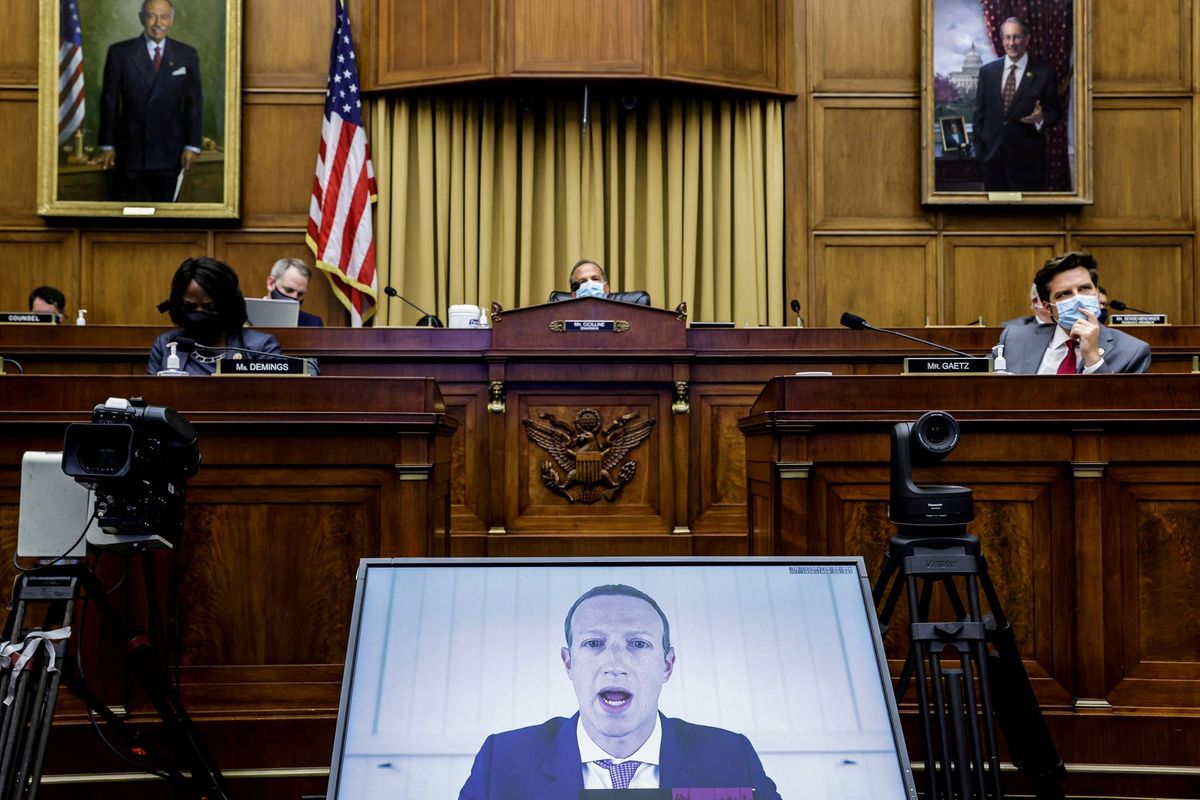Facebook and Twitter are in conservatives’ crosshairs after the NY Post censoring scandal

A few minutes every morning is all you need.
Stay up to date on the world's Headlines and Human Stories. It's fun, it's factual, it's fluff-free.
While the supposed Hunter Biden scandal has fallen out of the news cycle since the election, many view what happened to The New York Post as further proof that conservatives are routinely and disproportionally censored on Twitter and Facebook.
Now, weeks after Election Day, one curious take-away from the victory of President-elect Joe Biden is the lack of an “October surprise.” The most shocking events have happened after the election, with President Donald Trump denying the results and seeking to overturn them. As some predicted, by late October, voter’s minds were made up and no news stories significantly shifted votes.
However, in conservative circles, The New York Post Hunter Biden story was the story of the election. On October 14, the Post began publishing a series of articles involving alleged emails between Hunter, the president-elect’s son, and his business partners. Those emails, which could not be verified, purportedly showed Hunter and his father unethically making money off the Biden name.
Due to the lack of verification within the story, both Facebook and Twitter blocked users from sharing the articles, including the article from the Post. It was an uncharacteristically robust response, one that Republicans decried as partisan censorship. Conservatives claimed this was yet another example of social media platforms censoring speech to push a liberal narrative and favor the Democrats.
While the supposed Hunter Biden scandal has fallen out of the news cycle since the election, many view what happened to the Post as further proof that conservatives are routinely and disproportionally censored on Twitter and Facebook. In response, the chief executive officers of both companies were recently called before a Congressional hearing where Republicans grilled them on that exact matter.
What happened to The New York Post?
Shortly after The New York Post published its first story about Hunter Biden’s emails, both Twitter and Facebook took unprecedented action for a major news outlet: they moderated the sharing of the link. Twitter’s actions were more extreme, actively preventing users from posting a link to the original story. Facebook added restrictions to the link and said it would be fact-checked.
Andy Stone, Facebook’s head of policy communications, tweeted on October 14 about his company’s actions. Stone said of the Post’s article, “this story is eligible to be fact checked by Facebook’s third-party fact-checking partners. In the meantime, we are reducing its distribution on our platform.”
In a subsequent tweet, Stone stated, “This is part of our standard process to reduce the spread of misinformation. We temporarily reduce distribution pending fact-checker review.”
The next day, the official @TwitterSafety account tweeted a thread “to provide much needed clarity around the actions we’ve taken with respect to two NY Post articles.”
The seven-tweet thread provided two reasons for limiting the sharing of the story: the appearance of personal and private information in the article’s images and violations of Twitter’s “Hacked Materials Policy.” Regarding the latter issue, Twitter stated its policy “covers links to or images of hacked material themselves,” but it does allow discussion of said materials.
Later in the day, Twitter CEO Jack Dorsey tweeted a mea culpa, stating, “Our communication around our actions on the @nypost article was not great. And blocking URL sharing via tweet or DM with zero context as to why we’re blocking: unacceptable.”
Roughly 24 hours later, Twitter reversed course and allowed the article to be shared on its platform, although questions still remain about the validity of the Post’s reporting. While the social media ban did little to stop the story from spreading far and wide, for many conservatives, the 48-hour period in which the Post was blocked still represented dire overreach.
Jack Dorsey and Mark Zuckerberg before Congress
On October 16, Republican Senator Josh Hawley tweeted that both Twitter and Facebook would be subpoenaed by the Senate Judiciary Committee. That threat came to fruition on Tuesday, November 17, when Twitter CEO Jack Dorsey and Facebook CEO Mark Zuckerberg testified via video feed before the committee.
The committee meeting began with a statement from Republican Senator Lindsey Graham who said the meeting was “about censorship suppression in the 2020 election, sort of a deep dive when it comes to Twitter and Facebook, about the platforms and the decisions they make and how they make them. Can we do better? Do we need to do better?”
The meeting lasted four hours and, according The New York Times, involved 127 questions from the senators to the CEOs, with 67 of those questions regarding content moderation. The focus of the questions varied depending on the political parties of the senators:
“Republican senators … focused on the unproven idea that Facebook and Twitter unduly moderated posts by conservatives, compared with the amount of time spent labeling or taking down posts made by liberals … On the other side of the aisle, Democrats said the companies had not gone far enough to moderate harmful content.”
Despite their different focuses, members of both political parties agreed that the two social media giants were inconsistent in how they enforced their rules.
One other interesting tidbit from the hearing was Dorsey’s admission that Trump, once he is out of office, will no longer be afforded exceptions for posts that violated Twitter policy. Currently, when Trump posts misinformation, his posts are flagged, but they are not removed as they are for other users.
Trump has previously threatened Twitter with increased regulation over what he claims is censorship of his posts.
Zuckerberg said Facebook will not change the way it handles Trump’s posts once he is out of office.
Are conservatives censored on social media?
The belief that social media platforms like Twitter and Facebook censor conservatives is widespread among Republicans.
This is despite the fact that, according to a Politico investigation, “Right-wing social media influencers, conservative media outlets and other GOP supporters dominate online discussions” around the major issues of the day. Additionally, on Facebook, conservative news and opinion sites like Fox News, The Daily Wire and Breitbart tend to be the most popular links on a daily basis.
Kevin Roose, a tech columnist for The New York Times, created the @FacebooksTop10 Twitter account that provides a nearly daily update of the sources of those top-performing links. Conservative sites tend to fill the list. For instance, on November 2, the day before the election, all but one of the links was a conservative source.
Nonetheless, the perception that social media companies censor conservatives persists. This is perhaps because the companies have taken aim at conservative-spread conspiracy theories, specifically the pro-Trump QAnon movement. Twitter has also sought to stop the spread of misinformation about COVID-19, which has predominantly been shared by conservatives, including Trump’s eldest son.
In response, prominent conservative figures have advocated for alternative social media platforms, such as Parler, which promise unfettered free speech and no censorship.
Have a tip or story? Get in touch with our reporters at tips@themilsource.com




Comments ()